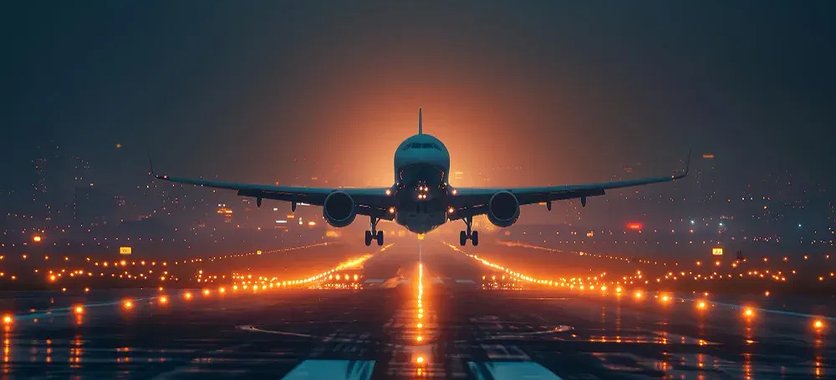3 Significant ways to ensure safety with Aircraft Maintenance Engineers




Loading...

Aircraft Maintenance Engineering (AME) plays a crucial role in ensuring the safety and reliability of air travel. In the aviation industry, the stakes are incredibly high, and maintaining operational efficiency is vital. AME professionals are tasked with inspecting, maintaining, and repairing aircraft to ensure they comply with strict safety standards. This field not only guarantees passenger safety but also helps aviation companies optimise performance and reduce downtime caused by technical faults.
Aircraft Maintenance Engineering (AME) plays a crucial role in ensuring the safety and reliability of air travel. In the aviation industry, the stakes are incredibly high, and maintaining operational efficiency is vital. AME professionals are tasked with inspecting, maintaining, and repairing aircraft to ensure they comply with strict safety standards. This field not only guarantees passenger safety but also helps aviation companies optimise performance and reduce downtime caused by technical faults.
With the global expansion of the aviation industry, the need for skilled AME professionals is increasing. Approved by regulatory authorities like the Directorate General of Civil Aviation (DGCA) in India, this specialised field has become a cornerstone of the industry. Aircraft Maintenance Engineering professionals are instrumental in keeping aircraft systems, including avionics, engines, and airframes, in peak condition.
At institutions like the Institute of Aeronautics & Engineering (IAE), Bhopal, students are trained to address the dynamic challenges of aviation maintenance. Recognised as one of the best AME colleges in India, IAE prepares students with the expertise and certifications needed to excel. With a career in AME, professionals contribute significantly to the aviation industry's safety and growth, making it an indispensable part of modern air transport.
An Aircraft Maintenance Engineer is not just a technician—they are the safety guardians of the skies. Before any aircraft is allowed to take off, it must be inspected and certified as airworthy by a licensed AME. This makes AMEs indispensable to the aviation ecosystem.
According to the Aircraft Act, 1934 and CAR-66 regulations laid out by DGCA, no aircraft can be released for flight without a Certificate of Release to Service (CRS) issued by a licensed AME.
The Aircraft Maintenance Engineering course is a professional training programme regulated by the DGCA in India. It is not a traditional engineering degree but a licensing programme that enables students to become certified to maintain and certify aircraft.
Must have passed 10+2 with Physics, Chemistry, and Mathematics (PCM)
or
Hold a 3-year engineering diploma in Mechanical, Electrical, Electronics, or Aeronautical streams
This makes the AME course ideal for students who are technically inclined and wish to enter the aviation sector directly after school or a diploma.
Academic training on aircraft systems, propulsion, avionics, and airframes
Practical training in live environments such as Maintenance Repair and Overhaul (MRO) organisations
Focused preparation for DGCA’s licensing examinations
The Institute of Aeronautics & Engineering (IAE), Bhopal, is one of the most reputed DGCA approved AME colleges in India. It has carved a niche for itself by offering world-class education and hands-on training in aircraft maintenance.
With its commitment to academic excellence and practical proficiency, IAE Bhopal ranks among the top AME colleges in India.
After completing the AME course and fulfilling DGCA’s requirements, students are eligible to apply for an AME license. This opens doors to a variety of roles in the aviation sector.
Airlines (e.g., Air India, Indigo, Vistara, SpiceJet)
MROs – Maintenance, Repair, and Overhaul companies
Aircraft Manufacturing Companies – Boeing, Airbus, HA
Airport Operators and Charter Service
International Aviation Companies, especially in the Middle East, Europe, and Southeast Asia
With hundreds of aircraft on order and the Indian government investing heavily in airport infrastructure, the future for AMEs is incredibly promising.
Many students wonder how an AME course compares to conventional degrees like Aeronautical or Aerospace Engineering. The key distinction lies in licensing and responsibility.
AMEs are legally authorised to certify aircraft airworthiness, a responsibility not granted to aeronautical engineers.
Even someone with a Ph.D. in Aerospace Engineering cannot sign off an aircraft unless they hold an AME license.
The AME course is job-focused and regulation-oriented, whereas engineering degrees are more theoretical and research-based.
For students looking for direct career pathways in aviation maintenance, the AME course from a DGCA-approved institute like IAE Bhopal is the most viable and rewarding option.
One of the biggest advantages of being an AME is the global mobility the license offers. Since the DGCA licensing system is aligned with ICAO (International Civil Aviation Organization) standards, Indian AMEs can work in over 190 countries.
As global air traffic continues to rise, especially in emerging markets, licensed AMEs from India are in high demand across regions like:
The Middle East
Southeast Asia
Africa
Europe (after required local validations)
This makes AME not just a national but a global career option.
In a world where aviation safety is paramount, Aircraft Maintenance Engineering stands as a profession of trust, responsibility, and technical excellence. With the aviation sector expanding rapidly, both in India and worldwide, certified AMEs are at the forefront of this transformation.
For aspiring aviation professionals, choosing a DGCA approved AME institute is the first step towards a high-impact, high-responsibility career. The Institute of Aeronautics & Engineering (IAE), Bhopal, offers everything a student needs: from rigorous training and practical exposure to industry placements and global recognition.
A career in AME is more than just a job—it's a commitment to safety, precision, and innovation. And with institutions like IAE Bhopal guiding the way, the sky is truly the limit.
Enquire